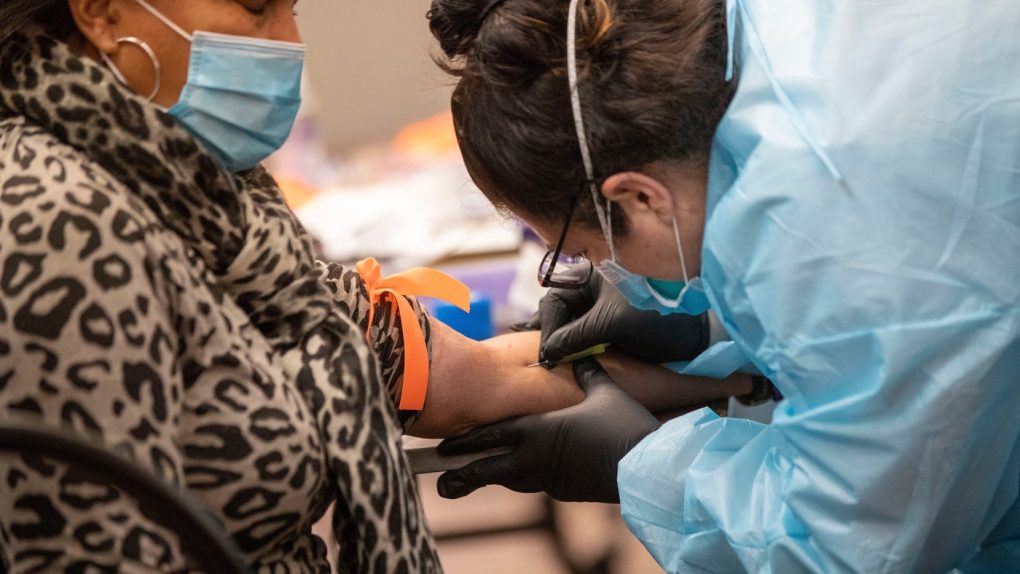- Coronavirus symptoms will be somewhat minor for most people, but some patients will experience a more severe version of COVID-19 that can lead to respiratory complications and potentially death.
- Researchers have studied sections of the human genome from COVID-19 patients and compared it to healthy people.
- The scientists identified two spots that contain genes that may influence COVID-19, concluding that people with Type A blood are more at risk of developing complications.
The main challenge for doctors treating patients infected with the novel coronavirus is the absence of an effective treatment that can prevent complications and death. Several studies have theorized ways to predict and prevent complications, and some drug therapies were able to help patients improve after their symptoms worsened. But we have yet to see any standard approach to treating COVID-19 patients who experience life-threatening respiratory and inflammatory issues.
New research points to another potential clue for predicting the course of COVID-19 in patients, and possibly treat the disease before severe complications arrive. Geneticists think a few particular genes may point to a predisposition for severe COVID-19, including a gene that’s responsible for blood types.
Patients with Type A blood are 50% more likely to need oxygen or require a ventilator, the European study said. Type O is associated with lower risk compared with all the other blood groups.
The research was published in pre-review form on medRxiv, and it’s the result of an incredible collaboration between doctors from Germany, Italy, Norway, and Spain. Blood samples were collected from 1,610 patients who needed oxygen or were put on ventilators. Separately, 2,205 people who were not infected with the novel coronavirus also donated blood samples.
A team at the University of Kiel in Germany extracted DNA from the samples and scanned it using a technique called genotyping. They looked at 9 million letters in the genome of each patient rather than analyzing the full 3 billion letter sequence for each person, The New York Times reports. The researchers were looking for genetic differences between severely sick patients and the healthy cohort. They found two spots in the genome, two loci, where the sick people shared the same genes as the healthy ones.
In one of these locations, the gene that codifies the blood type of an individual resides. That’s how the researchers discovered that Type A blood appears to be a risk factor for COVID-19 complications. The study seems to confirm similar research from China that determined that patients with Type A blood were more likely to experience a severe case.
The doctors can’t explain this finding. “That is haunting me, quite honestly,” Dr. Andre Franke told The Times. The same locus where the blood-type gene is found also hosts DNA code that acts as an on/off switch for a gene that produces a protein involved in triggering strong immune responses. Cytokine storms, which are strong immune responses, are phenomena associated with COVID-19 complications that can lead to death.
The researchers found a second spot in the genetic sequences they analyzed that can be associated with severe COVID-19 case. That’s a locus on Chromosome 3 that houses no less than six genes. That makes it impossible to tell which one of them influences the progress of the illness. One of them encodes a protein that can interact with the ACE2 receptor the coronavirus uses to enter cells. Another is an immune gene that codifies an immune-signaling molecule.
More research is needed to provide more answers. Franke and his colleagues are part of an international project called COVID-19 Host Genetics Initiative. 1,000 researchers from 46 countries are collecting DNA samples from COVID-19 patients. A website already exists for the initiative, where researchers are sharing their findings.
University of Helsinki genetic epidemiologist Andrea Ganna told The Times that the newly available data pointing to a single spot on Chromosome 3 is relevant for COVID-19 severity. If these studies are successful, researchers may be able to come up with marker tests that can help physicians assess the risk that patients might develop complications. Furthermore, treatments for severe COVID-19 patients may be developed based on these genetic findings.








